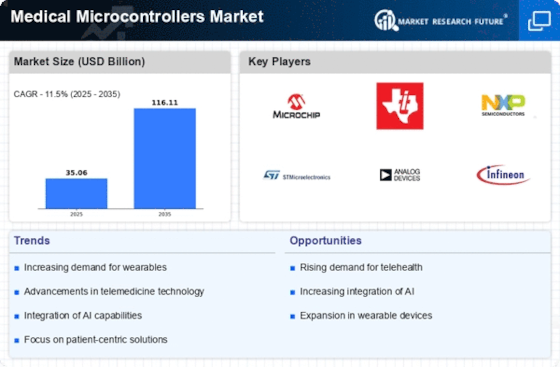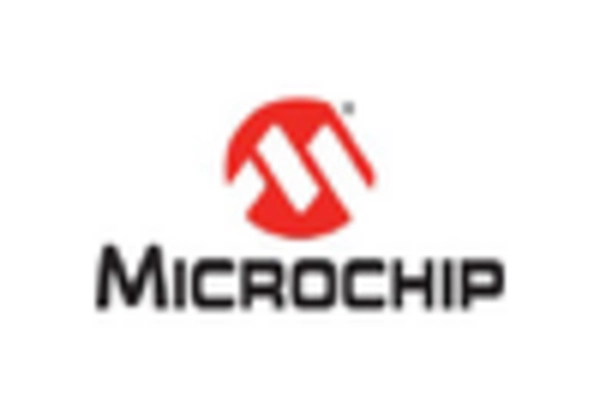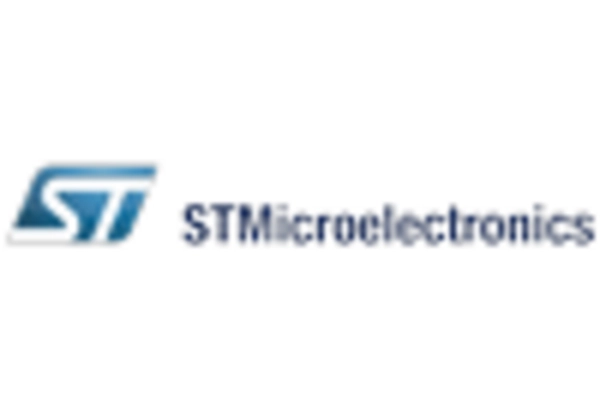Market Trends
Key Emerging Trends in the Medical Microcontrollers Market
The Medical Microcontrollers Market is witnessing notable trends that are reshaping the landscape of healthcare technology. One prominent trend is the increasing integration of artificial intelligence (AI) and machine learning (ML) with medical microcontrollers. This convergence enhances the capabilities of medical devices, allowing for intelligent data processing, predictive analytics, and personalized patient care. AI-powered microcontrollers are becoming instrumental in diagnostics, treatment planning, and remote patient monitoring, reflecting a shift towards more data-driven and efficient healthcare solutions.
Remote patient monitoring is emerging as a key trend in the Medical Microcontrollers Market. With the rise of telemedicine and the growing emphasis on home healthcare, there is a growing demand for medical devices equipped with microcontrollers that enable continuous monitoring of patients outside traditional healthcare settings. These devices facilitate real-time data collection, enabling healthcare providers to remotely track patients' health status, adherence to treatment plans, and intervene promptly when necessary. The trend towards remote patient monitoring aligns with the broader goal of improving patient outcomes and reducing the burden on healthcare facilities.
Miniaturization is another significant trend in the Medical Microcontrollers Market. As technology continues to advance, there is a notable shift towards developing smaller and more compact medical devices with embedded microcontrollers. Miniaturization not only enhances the portability of medical devices but also allows for less invasive procedures and increased patient comfort. The trend towards smaller form factors is particularly evident in wearable medical devices, where microcontrollers play a crucial role in monitoring vital signs, activity levels, and overall health metrics.
Interconnectivity and the Internet of Things (IoT) are driving trends in the Medical Microcontrollers Market. Medical devices are increasingly designed to be part of interconnected ecosystems, enabling seamless data exchange and communication between devices and healthcare systems. This connectivity enhances the efficiency of healthcare delivery, facilitates remote monitoring, and enables the integration of patient data into electronic health records. The trend towards interconnected medical devices reflects a broader effort to create a cohesive and interoperable healthcare infrastructure.
The emphasis on cybersecurity is a growing trend in the Medical Microcontrollers Market. As medical devices become more connected and data-driven, the need to secure sensitive patient information and ensure the integrity of healthcare systems becomes paramount. Manufacturers are incorporating robust cybersecurity measures into medical microcontrollers to safeguard against potential threats and vulnerabilities. This trend underscores the importance of addressing cybersecurity concerns in the development and deployment of medical devices, fostering trust among healthcare providers and patients.
Personalized medicine is influencing trends in the Medical Microcontrollers Market. The move towards tailoring medical treatments to individual patient characteristics is driving the demand for medical devices that can gather and process personalized health data. Microcontrollers play a crucial role in supporting personalized medicine by enabling the development of devices that can adapt to individual patient needs, provide targeted therapies, and contribute to more precise and effective healthcare interventions.
















Leave a Comment